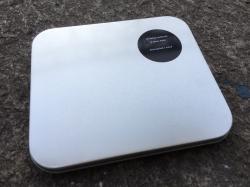
Percussion/Voice
Kahn/WolfarthConfront ccs 81 / CD-R
released: London, 2017
Jason Kahn - voice
Christian Wolfarth - percussion
"When I saw Christian Wolfarth and Jason Kahn do their thing at a beautiful old-fashioned cinema in St Leonards in Sussex back in September 2017, I was captivated by their sheer maximalist approach to what is really, very minimalist themes and equipment. Wolfarth had a snare drum on a stand and a cymbal loose, with a small selection of sticks and beaters. Kahn used only his voice, unamplified. Out of this they conjured a strikingly beautiful array of quiet improv narratives, the 1913 building lending a minimalist yet distressed-opulent backdrop to their manoeuvrings.
The material on this disc was recorded and mastered by Kahn in Zurich. The packaging cites Jason as “voice” while Christian Wolfarth is credited with “percussion”. On the first piece, initially at least, Wolfarth is sounding a large cymbal, gong or tam tam of some sort, while Kahn exerts his full effort into sounding his voice. Kahn differs from many of the best-known vocal improvisors – such as Maggie Nicols or Phil Minton – in that rather than presenting what often can sound like a fully developed set of techniques, Kahn presents his vocal sound raw and develops it as if for the very first time; unstable on the lip of the precipice and seemingly about to disappear over the edge.
The first of two pieces pairs the snare drum (the snare off) with Kahn’s lip smacking and wheezing very effectively. Kahn sounds like he’s genuinely struggling for breath. What follows is gargling, heaving; Kahn’s approach to his own vocal physiognomy seems to be a lot about the movement of air over the vocal chords over time, rather than wet-mouthed glossolalia. Christian Wolfarth bows his cymbals; what he does could be produced by many different pieces of equipment, particularly likely given the huge family that is contemporary EAI. A bowed cymbal is, after all, a kind of modulated sine wave, but its characteristics depend very much upon whose hands are operating. Wolfarth produces results very different to something John Stevens or Eddie Prevost might. Plus the spectacle is lost with CDs. The sheer joy of watching how the performers make the sounds. In St Leonards, the duo were both seated in front of the red velvet cinema curtain, making very small movements which greatly added to the sense of tension and drama.
On the second piece, things get a bit more dark. Hissing and a softly activated drum head to harvest the low overtones. Six minutes in and Wolfarth is beating a cymbal while Kahn produces agitated groaning but there is a third sound – high pitched whine… As the piece continues, Kahn eventually resembles acoustic wind instruments; bass clarinet came to mind at one point.
I have enjoyed seeing Jason Kahn perform on several other occasions, and the thing that always impresses me is his ability to move forward constantly; changing his approach, his instrumentation, his “voice”. He is a visual artist as well as a musician, and has written a couple of books on listening. In all his creative activities he is prolific.
It is perhaps ironic that Kahn – a hardcore-punk rock drummer in a previous career – has enlisted a high-level percussionist to work with. Christian Wolfarth is a man who clearly spends a lot of time drumming. He teaches percussion when he is not actually touring. His collaboration history reads like a Who’s Who of jazz, improvisation and outsider genres. From Evan Parker, Norbert Möslang and Burkhard Beins to Joke Lanz via Irène Schweizer. Like Seijiro Murayama, he has no qualms about repetition; more than that: he relishes it. Live, his playing is metronomic in the purest way; there is no deviation when he plays a repeated section. At all. Repetition perfection. But when deviation is required, he is a master of subtle modulation.'"
Paul Khimasia Morgan, (The Sound Projector, July 2018)
"Just over half an hour of music. But if one measures a release by the intensity that it conveys – which, in this circumstance, can literally be cut with a knife – Percussion / Voice is the equivalent of a protracted excruciating effort. And – as they say in the trade – it’s not something for the faint-hearted, or for less than centered listeners.
Those who have been exhausted by this scribe’s awkward rants and grunts since the beginnings know that both artists enjoy a high degree of esteem on these shores. Either in solitary undertakings or in collaborative outings, Wolfarth and Kahn have demonstrated a willingness to overcome the instrumental limits time and again. This recording is emblematic in that regard, comprising forms of expression that burn inside for real.
In particular – and this should not come as a surprise – Kahn’s use of the voice’s rawest, “from-the-gut” constituents strikes a nerve. Having momentarily left behind his investigations of percussion and electronics, he opts for an extremely physical phonemic method that still demands the performer’s separation from the fleshly container. A combination of tangible abstraction, shamanistic connection with antithetic dimensions, and primeval aliveness; at times we’re reminded of a newborn child crying his heart out, perhaps aware of what is going to hurt him later on in life.
On the other side, Wolfarth represents an ideal complement to Kahn’s instinctive withdrawal from rationality. The skilled dissemination of percussive hues and unplanned patterns across the environment delineated by individual receptiveness is a primary reason of our appreciation of this man’s work. Incisive signals deriving from the handling of skins and the bowed cymbals – as distant from a bodily emission as they can be – shape up a magnificent counterpoint, escorting the voice one moment, enhancing its harmonics with their own the next. When the respective focuses reach a “loss of consciousness” joint apex, the result is chilling in its brutal directness."
Massimo Ricci (Touching Extremes, january 2018)
